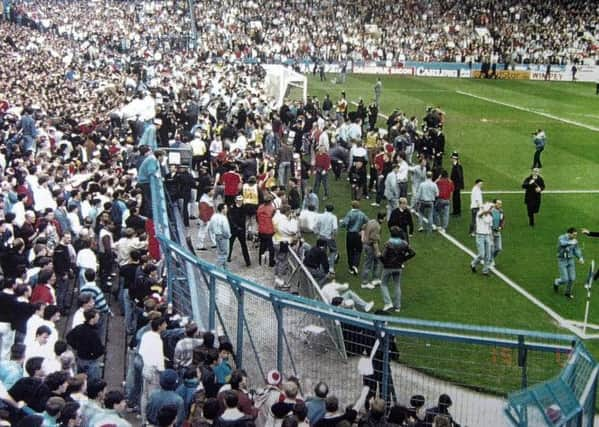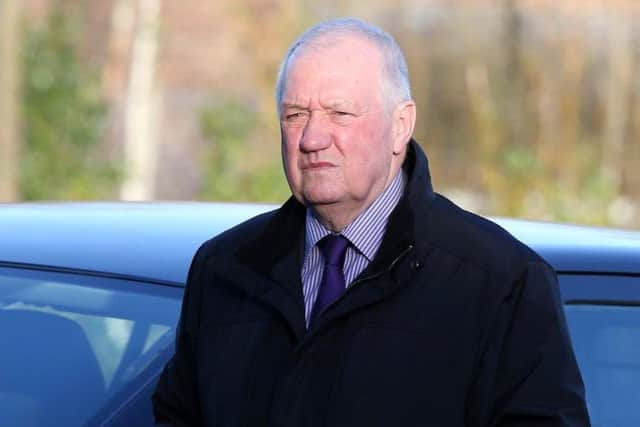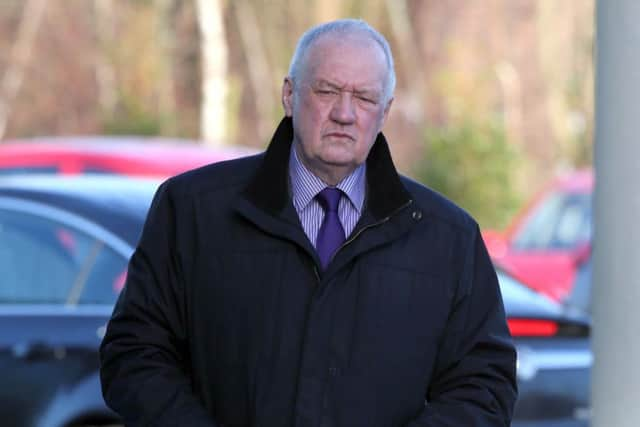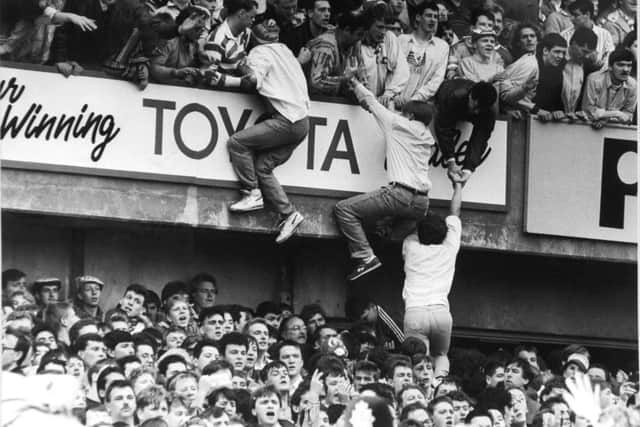My big lie: Police commander finally says sorry to Hillsborough families


The former chief superintendent, in charge of policing at the ground, said he “deeply regretted” telling not telling FA chief executive Graham Kelly that it was his decision to open the exit gates at the stadium in the minutes before the fatal crush.
Minutes later Mr Kelly, who had gone up to the control room to speak to Mr Duckenfield, went on to make the initial misleading public statement on the cause of the worst disaster in British sporting history.
Advertisement
Hide AdAdvertisement
Hide AdSpeaking at the inquests into the deaths of 96 Liverpool fans in Warrington today, Mr Duckenfield admitted he had not given Mr Kelly “sufficient information to appreciate the situation as it occurred”.
He said he had told Mr Kelly “something in the order of, some fans have got in through a gate” and that he had not told him the gates had later been opened at his request.
Christina Lambert QC, counsel to the inquests, asked him: “Do you consider now that you told them a lie?” He replied: “Yes. I certainly now appreciate it was wrong and completely open to misinterpretation.”
When asked about his motivation for lying, he said: “I was in a situation that I was totally untrained for, totally unprecedented, and I make no excuses, I am the man who did it, but I faced a difficult situation.
Advertisement
Hide AdAdvertisement
Hide Ad“I was probably deeply ashamed and embarrassed, greatly distressed and I probably didn’t want to admit to myself or anyone else, what the situation was.”
He added: “What I would like to say to Liverpool fans is this. I regret that omission and I shall regret it to my dying day.
“I said something rather hurriedly without thinking of the consequences and the trauma, the heart-ache and distress that the inference would have caused to those people who were already in a deep state of shock, who were distressed.
“I deeply regret what happened on the day. It was a major mistake on my part. I have no excuses. I apologise unreservedly to the families and I hope they believe it to be a very sincere apology.”
Advertisement
Hide AdAdvertisement
Hide AdMr Duckenfield, 70, said it was “one of the biggest regrets of my life” that he ordered exit gates at the ground to be opened without considering where supporters would go.


Mr Duckenfield said he was “overcome by the enormity of the situation” when he gave the order to open an exit gate to the Leppings Lane terrace to alleviate a crush outside the ground.
And he said he “regretted bitterly” not realising that hundreds of Liverpool supporters would be flooding onto the already crowded terraces in the five minutes after giving the order.
He told inquests into the deaths of 96 Liverpool fans that he took the decision after being told by another senior officer that people would be killed if he didn’t open exit gate C at the ground.
Advertisement
Hide AdAdvertisement
Hide AdHe said: “The sole thought I had was that I had to save lives. I was left with no option but that I had to comply with the request.


“It is difficult to understand in this quiet courtroom but on that afternoon when you make a decision of that nature it really is, I am at a loss to describe it other than to say, it is a momentous decision and your mind is such that you don’t think of that next step.”
He admitted that he gave no thought to where the fans would go after they entered through the gates. The inquest was told that between 600 and 800 fans entered one of the pens in the minutes afterwards.
He said: “It is fair to say that that is arguably one of the biggest regrets of my life, that I didn’t foresee where fans would go when they came in through the gates.”
Advertisement
Hide AdAdvertisement
Hide AdWhen it was put to him by Christina Lambert QC, counsel to the inquests, that he should have foreseen this, he replied: “If I had been a fully competent experienced, knowledgeable match commander like Mr Mole or Mr Freeman, I no doubt would have thought about it, but I was not in that position.”
He added: “It is fair to say I was overcome by the enormity of the situation and the decision I had to make, and as a result of that, this is probably very hard to admit, as a result of that I was so overcome, probably with emotion, I was having in that situation, that my mind went blank.”
Ms Lambert asked Mr Duckenfield if he agreed that “a match commander of reasonable competence ought to have thought where these fans might go”. He said: “I accept that.”


He added: “Under the circumstances, with my limited ability, I accept it was a mistake, a mistake I should not have made, a mistake I regret bitterly, but I was not consciously thinking about the situation at that time. It was a grave mistake and I apologise profusely.”
Advertisement
Hide AdAdvertisement
Hide AdMr Duckenfield was shown footage of fans climbing over the fence onto the pitch and the gates between the pens being opened at 2.55pm, but said it didn’t occur to him that this could be caused by overcrowding.
Ms Lambert asked him: “What did you think was happening, what did you think was the cause of these problems.”
He replied: “It may seem strange to say this, but I can’t give an answer. I am not avoiding the issue. Looking at it now, I don’t know.”
Mr Duckenfield also told of his regret that he did not find out about the thousands of Liverpool fans gathering outside the ground in the minutes before the fatal crush.
Advertisement
Hide AdAdvertisement
Hide AdWith half an hour to go until kick-off, he said and other senior officers at the ground were not concerned about the crowds gathering outside the Leppings Lane terrace.
He admitted earlier in the hearing at Warrington that he was unaware Sheffield Wednesday had a counting system for knowing how many people had entered through the turnstiles.
Christina Lambert QC, counsel to the inquests, told him that at 2.15pm there were 7,000 fans yet to enter and by 2.30pm still 5,700 fans yet to enter.
Ms Lambert said: “It might be said by others that by this time, at 2.30pm, you ought to have been taking steps to find out exactly how many fans had yet to get in.”
Advertisement
Hide AdAdvertisement
Hide AdHe replied: “That is correct ma’am. It is with regret that I didn’t.”
Ms Lambert asked: “Do you believe that if you had made that inquiry, on the basis of what you now know, those figures that I gave you earlier might have been available to you?” Mr Duckenfield replied: “Yes.”
He accepted that he should have taken steps to delay kick-off at that stage and deploy reserve officers to help with policing on Leppings Lane.
But he told the inquest that at this point he was also concerned with what was happening on the Spion Kop at the other side of the ground, where Liverpool fans had got in with the Nottingham Forest fans.
Advertisement
Hide AdAdvertisement
Hide AdWhen asked about the atmosphere in the control box at this point, he said: “I think it would be an order of professional concern about having to concentrate on two areas of difficulties but I don’t think there was any concern at that stage.”
Ms Lambert asked Mr Duckenfield if he had any sense of “trouble brewing” or “impending crisis”. He replied: “No.”
The inquests heard that a few minutes later, at around 2.44pm, Mr Duckenfield and other senior officers in the control room “lost concentration to some extent” because the radio system had stopped working.
He said: “We all had to move out of our places and we lost our focus and concentration and when we returned to our places and regained our concentration the situation had changed dramatically.”
Advertisement
Hide AdAdvertisement
Hide AdHe agreed that by this point control of the crowd had been lost outside the ground and said he asked for 50 extra men and all available horses to be sent to the scene.
He was asked whether he agreed it was a mistake at this point that he did not ask how many fans were yet to enter, and he said: “I do.”
Ms Lambert asked him why he didn’t make an announcement to the crowd about kick-off being delayed and he said he didn’t want to risk an adverse reaction among other fans.
He said: “In a crisis you make quick decisions, you assess situations. Sometimes these decisions aren’t correct in hindsight but you make them with the best of intentions.”
Advertisement
Hide AdAdvertisement
Hide AdThe inquests were told Superintendent Bernard Murray, one of the other senior officers on duty, made the first of two requests for the exit gates to be opened at around this time.
Mr Duckenfield said he understood this was due to the “crush outside the turnstiles” but said that to open these gates would be “totally unprecedented”.
He said: “It was something you just didn’t do. To open exit gates you would lose control of the whole situation. People would enter who might be in drink, people would enter with missiles, people who might enter without tickets. It would destroy the whole reason for the operational order.”
Mr Duckenfield said he saw that the gate had been opened, but only briefly while a fan was escorted out, allowing other supporters to get in.
Advertisement
Hide AdAdvertisement
Hide AdHe was shown footage of the Leppings Lane terrace itself with 15 minutes to go until kick-off, and said the level of crowding was not “in any way different from that which was normality at the time”.
He was asked if he though at this point that it would have dangerous for any more fans to be let into the terrace at this point, he replied: “On the basis of what I saw and what crossed my mind, at that stage no.”
Earlier Mr Duckenfield said a two-hour period in the run-up to kick-off was a “complete blank” in his mind.
He described giving a briefing to officers in the North Stand of the ground at 10am on April 15, 1989, where he said the police’s role was to ensure fans had a “good day out”.
Advertisement
Hide AdAdvertisement
Hide AdBut when asked by Ms Lambert what he did in the more than two hours between the briefing and arriving in the stadium control room at 2pm he said he had “a complete blank”.
He said: “Because of my personal circumstances there are periods when my knowledge is good or non-existent. Between me giving the briefing and going into the control room is a complete blank in my mind.”
He said he thought he drove around the local area during the two-hour period and remembered being in a car. Ms Lambert put to him that he had an opportunity during this period to tour the ground and familiarise himself with it.
He said: “I don’t know whether I did that or not. I am not being difficult, it is just one of those blanks that has occurred over the years, shall we say.”
Advertisement
Hide AdAdvertisement
Hide AdHe added: “I am not asking for pity or sympathy. Because of the situation over a number of years there are blanks and that is one of those. As to why it is blank, I don’t know, but that is how it is in my mind.”
Mr Duckenfield told the inquests today that he had only a “basic knowledge” of the layout of the ground at the time of the match.
Asked about his lack of knowledge of certain parts of the Leppings Lane terrace he said: “In a perfect world I should have known but in the time allocated to me, I did not know.”
Mr Duckenfield was allowed to retire on a full pension, two years after the tragedy. He was said to be suffering from severe depression and post-traumatic stress disorder.
Advertisement
Hide AdAdvertisement
Hide AdIn 2000, he and his deputy, the late Supt Bernard Murray, were tried for manslaughter in a private prosecution brought by the Hillsborough Family Support Group. After six weeks the jury found Mr Murray not guilty and said it could not reach a verdict on Mr Duckenfield.
The judge, Mr Justice Hooper, ruled out a majority verdict and refused a retrial on the grounds that Mr Duckenfield had faced public humiliation and that a fair trial would be impossible.
READ MORE...